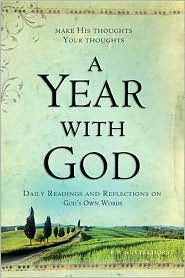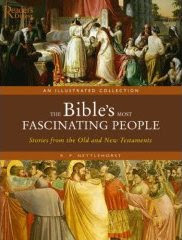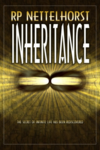I continue to read through Today's New International Version (TNIV) and continue to find that I like it. I have a hard time understanding the intense, emotional hatred some have toward this translation. Quite frankly, in looking at a few of the anti-TNIV websites, they often remind me of the KJV Only crackpots I've occasionally had the unfortunate experience of running up against. Most, if not all that I have seen so far, have limited knowledge or understanding of how to translate, translation theory, or anymore than a rudimentary understanding of Greek and Hebrew. The rest simply have an approach to translation that I don't agree with, as well as some different theological and philosophical presuppositions. As far as I can see thus far, the opposition seems to boil down to one thing generally, and that is the thought that the Bible really is mostly only for men, and women must be kept in their place. Oh well. I can't disagree any more strongly with them, then. Perhaps, given what those who oppose the TNIV argue, I guess I must actually be a liberal.
The Southern Baptist Convention at a recent convention, apparently issued a statement denouncing the TNIV. Oh well. I'm a Southern Baptist and often disagree with what the convention says. And what the convention says really doesn't matter, after all, since it is not binding, given the nature of being a Baptist. I thought the convention's call awhile back to boycott Disney was goofy, too, and I made a point after that to visit Disneyland often and bought quite a few Disney DVDs.
Personally, I think it is pretty clear that biblically both men and women can have teaching and leadership roles and that outside of the obvious biological differences, men and women can equally aspire to any role and activity, and both are equally created in the image of God. If that makes me a liberal, so be it.
Monday, March 28, 2005
Tuesday, March 22, 2005
According to a report on MSNBC some scientists may have managed to create a mini big-bang with the Relativistic Heavy-Ion Collider at Brookhaven National Laboratory. Science fiction authors have speculated about such things and about creating "pocket" universes. I can't say that I'm surprised. After all, the Bible tells us that humanity has been created in the image of God and God himself commented that "nothing they imagine to do will be impossible for them." We were made to be like God and seem to be living up to our potential, at least in some ways.
Wednesday, March 16, 2005
When I was at the SBL meeting in Austin Texas back in November, I had talked to someone at the Zondervan booth and they had given me information on their new translation of the Bible, the TNIV (Today’s New International Version), which is a revision of the NIV. They gave me a book about it and told me they would send me a copy of the Bible when it was available.
Of course, they didn’t do this out of the kindness of their heart, but rather as part of their marketing strategy, since I’m a “person of influence” at least in some small sense, since I'm a professor.
Well, the promised book arrived in the mail yesterday. It is a thinline European leather burgundy and brown copy of the thing, which retails for 30 bucks; it is a very nice copy, with the nice leather smell, fitting comfortably in the hand and much fancier than the paperback I had expected.
Anyhow, I have been reading through bits of it off and on today and I must say I really like it; they’ve fixed several of the problems that I had seen in the NIV. For instance, the passages in Ezekiel that had obscured the explicitly sexual nature of some of his prophesies have been unobscured and made explicit (as, for instance, Ezekiel 16:25). A badly rendered part of Proverbs 30 (30:1) now makes some sense. In Psalm 23 it no longer says “valley of the shadow of death” but instead, the more accurate “darkest valley.” On top of all that, the translation is also in keeping with modern sensibilities when both genders are being addressed. It makes clear that it really is both genders, rather than saying "brothers" or "men" when both were really in view. In most cases I believe the alterations have improved the accuracy of the translation, for instance in Genesis 1 where instead of saying that God created Man in His image, it now says he created “human beings” in the image of God, which I think helps make more obvious what is pretty clear in Hebrew, that it is humanity as a whole that is the image of God, not an individual, any more than the "body of Christ" or "bride of Christ" can be localized in a single person. So far, I think the TNIV is a much improved translation.
Of course, they didn’t do this out of the kindness of their heart, but rather as part of their marketing strategy, since I’m a “person of influence” at least in some small sense, since I'm a professor.
Well, the promised book arrived in the mail yesterday. It is a thinline European leather burgundy and brown copy of the thing, which retails for 30 bucks; it is a very nice copy, with the nice leather smell, fitting comfortably in the hand and much fancier than the paperback I had expected.
Anyhow, I have been reading through bits of it off and on today and I must say I really like it; they’ve fixed several of the problems that I had seen in the NIV. For instance, the passages in Ezekiel that had obscured the explicitly sexual nature of some of his prophesies have been unobscured and made explicit (as, for instance, Ezekiel 16:25). A badly rendered part of Proverbs 30 (30:1) now makes some sense. In Psalm 23 it no longer says “valley of the shadow of death” but instead, the more accurate “darkest valley.” On top of all that, the translation is also in keeping with modern sensibilities when both genders are being addressed. It makes clear that it really is both genders, rather than saying "brothers" or "men" when both were really in view. In most cases I believe the alterations have improved the accuracy of the translation, for instance in Genesis 1 where instead of saying that God created Man in His image, it now says he created “human beings” in the image of God, which I think helps make more obvious what is pretty clear in Hebrew, that it is humanity as a whole that is the image of God, not an individual, any more than the "body of Christ" or "bride of Christ" can be localized in a single person. So far, I think the TNIV is a much improved translation.
Thursday, March 10, 2005
Been awhile since I posted. I had two weeks of jury duty and then found myself overwhelmed with projects around my home, such as cleaning out five years worth of junk from my garage. The jury duty I liked. Here's a copy of the collumn I wrote for the newspaper, Ridge Rider News, that I write for each week:
Just before Christmas two red and white envelopes arrived in the mail. One was addressed to my wife, one was addressed to me. Many people dread getting the summons in the mail announcing that they are required to report for jury duty. Many become quite creative in figuring out ways to avoid doing their duty. I’m not certain I understand the reluctance to serve. My wife has wanted to serve on a jury for most of her life and had never gotten a summons before. She was overjoyed. I’d served on only one jury so far and was equally pleased by the opportunity.
Jury duty is actually a wonderful privilege. Given the history of the world, with tyrants dispensing sentence at their whim, sometimes for no better reason than that the poor defendant brought them bad news, we should be more grateful for the privilege and more in awe at such a system of justice.
Our jury service was scheduled for February and although we had to work a bit at finding child care, we were not going to be deterred.
So, bright and early one Monday morning we made our way to the local court house, passed through the metal detectors, and sat down in the jury assembly room. There was coffee there, so I was mostly content. After watching a short video giving an overview of jury service, one of the judges came and welcomed us and thanked us for actually showing up.
About an hour after we arrived, we went up to separate courtrooms where we sat through the jury selection process. I was among the first eighteen called forward out of a group of forty-five. My wife had a similar experience in her courtroom.
After being told what the trial would be about, we were given lists of questions to answer out loud. One by one, we were questioned by the judge and attorneys, to find out if we had any biases or issues that would make it hard for us to be objective.
In the end, both my wife and I were selected. My wife served as an alternate in a drug-related case that ended in a mistrial. An alternate is sort of like a spare tire or the runner up in the Miss America pageant. If one of the jurists was at some point unable to continue, my wife would have been called on to take that person’s place.
I served as jury foreman on a child molestation case. We found the defendant guilty about a half hour after we went into deliberations. It wasn’t very hard to make the decision, given that we had both DNA evidence from the aborted fetus and the defendant’s own confession in a forty minute video where he went into excruciating detail about what he’d done to his girlfriend’s twelve year old sister.
Despite the very unpleasant nature of the case, the process of serving on the jury was anything but. In the United States, not only do we get to vote for people to represent us in the legislative, executive and judicial duties of running our government, thanks to the nature of the judicial process, we also get to participate directly. As the judge told us, he was the judge of the law and would instruct us on that, but we were the judges of the facts. Without the twelve of us on the jury, there simply could be no trial. It was entirely up to us whether justice would be served.
The jury was made up of a cross section of the public. We had aerospace workers, school teachers, retired people, housewives, mechanics and a body shop owner. Ages ranged from twenty-three to seventy-three. Half were male, half were female. Two were Asian, two were African-American and the rest white. One was a naturalized American citizen.
While I was attending college in the seventies, this Cambodian man was suffering persecution and imprisonment from the Khmer Rouge. We were about the same age, but our life experiences could not have been much more different. And I couldn’t help but think what a wonder he must have found the whole process of serving on a jury. In his youth he suffered in a country where people were locked away without trial, without recourse, and without hope. Two million of his countrymen were executed without trail. He was a man who had suffered powerless and without justice at the hands of communists, who now found himself empowered with the duty and privilege of determining justice.
Sometimes in our day to day life, watching the news on TV, we may wonder if civil rights and justice have made any progress in this country. Sometimes we might wonder if there’s anything we can do to help make things better or if it’s just all out of our control and beyond hope. But get outside, go into the world, sit on a jury, watch the proceedings in a court, watch the care that is taken to ensure that both sides are heard, that rights are protected, and you’ll be encouraged.
The evidence against the defendant in the case I served on was overwhelming. There was no doubt as to his guilt. And yet, at every step, this defendant’s rights were protected, he was treated respectfully, and all involved went out of their way to ensure that the proper care was taken.
At the very beginning of the case, we were reminded that in our system of jurisprudence, a person is considered innocent until proven guilty. If, following the opening arguments of defense and prosecution counsel, we had been asked to render a verdict, there would have been only one we could give: not guilty. In the United States, a person is considered innocent until proven guilty beyond a reasonable doubt. The burden of proof is entirely on the shoulders of the prosecution. The defense is not required to say a word. And until the prosecution gives evidence, innocence is assumed. Accusations and well-crafted opening statements are not evidence. They mean nothing in terms of demonstrating guilt. Innocence remains unbowed until the facts show otherwise. As a people, we have decided that we would rather have guilty people go free than have one innocent man be punished. We stack the deck on the side of innocence. I think that’s a good thing.
Both attorneys were young women; the defense attorney was white, the prosecuting attorney was African American. The bailiff was a woman. In my wife’s court, the judge was a woman. If you ever wonder whether opportunities have improved for women and minorities, simply consider all of that. It was good to see the diversity, the ease with which people of a wide range of backgrounds and ethnicities came together in that courtroom to help justice prevail.
The next time you get a jury summons, don’t toss it away, and don’t try to avoid your civic responsibility. You wouldn’t try to get out of your right to vote, so why would you want to get out of your right to take part in executing justice?
Just before Christmas two red and white envelopes arrived in the mail. One was addressed to my wife, one was addressed to me. Many people dread getting the summons in the mail announcing that they are required to report for jury duty. Many become quite creative in figuring out ways to avoid doing their duty. I’m not certain I understand the reluctance to serve. My wife has wanted to serve on a jury for most of her life and had never gotten a summons before. She was overjoyed. I’d served on only one jury so far and was equally pleased by the opportunity.
Jury duty is actually a wonderful privilege. Given the history of the world, with tyrants dispensing sentence at their whim, sometimes for no better reason than that the poor defendant brought them bad news, we should be more grateful for the privilege and more in awe at such a system of justice.
Our jury service was scheduled for February and although we had to work a bit at finding child care, we were not going to be deterred.
So, bright and early one Monday morning we made our way to the local court house, passed through the metal detectors, and sat down in the jury assembly room. There was coffee there, so I was mostly content. After watching a short video giving an overview of jury service, one of the judges came and welcomed us and thanked us for actually showing up.
About an hour after we arrived, we went up to separate courtrooms where we sat through the jury selection process. I was among the first eighteen called forward out of a group of forty-five. My wife had a similar experience in her courtroom.
After being told what the trial would be about, we were given lists of questions to answer out loud. One by one, we were questioned by the judge and attorneys, to find out if we had any biases or issues that would make it hard for us to be objective.
In the end, both my wife and I were selected. My wife served as an alternate in a drug-related case that ended in a mistrial. An alternate is sort of like a spare tire or the runner up in the Miss America pageant. If one of the jurists was at some point unable to continue, my wife would have been called on to take that person’s place.
I served as jury foreman on a child molestation case. We found the defendant guilty about a half hour after we went into deliberations. It wasn’t very hard to make the decision, given that we had both DNA evidence from the aborted fetus and the defendant’s own confession in a forty minute video where he went into excruciating detail about what he’d done to his girlfriend’s twelve year old sister.
Despite the very unpleasant nature of the case, the process of serving on the jury was anything but. In the United States, not only do we get to vote for people to represent us in the legislative, executive and judicial duties of running our government, thanks to the nature of the judicial process, we also get to participate directly. As the judge told us, he was the judge of the law and would instruct us on that, but we were the judges of the facts. Without the twelve of us on the jury, there simply could be no trial. It was entirely up to us whether justice would be served.
The jury was made up of a cross section of the public. We had aerospace workers, school teachers, retired people, housewives, mechanics and a body shop owner. Ages ranged from twenty-three to seventy-three. Half were male, half were female. Two were Asian, two were African-American and the rest white. One was a naturalized American citizen.
While I was attending college in the seventies, this Cambodian man was suffering persecution and imprisonment from the Khmer Rouge. We were about the same age, but our life experiences could not have been much more different. And I couldn’t help but think what a wonder he must have found the whole process of serving on a jury. In his youth he suffered in a country where people were locked away without trial, without recourse, and without hope. Two million of his countrymen were executed without trail. He was a man who had suffered powerless and without justice at the hands of communists, who now found himself empowered with the duty and privilege of determining justice.
Sometimes in our day to day life, watching the news on TV, we may wonder if civil rights and justice have made any progress in this country. Sometimes we might wonder if there’s anything we can do to help make things better or if it’s just all out of our control and beyond hope. But get outside, go into the world, sit on a jury, watch the proceedings in a court, watch the care that is taken to ensure that both sides are heard, that rights are protected, and you’ll be encouraged.
The evidence against the defendant in the case I served on was overwhelming. There was no doubt as to his guilt. And yet, at every step, this defendant’s rights were protected, he was treated respectfully, and all involved went out of their way to ensure that the proper care was taken.
At the very beginning of the case, we were reminded that in our system of jurisprudence, a person is considered innocent until proven guilty. If, following the opening arguments of defense and prosecution counsel, we had been asked to render a verdict, there would have been only one we could give: not guilty. In the United States, a person is considered innocent until proven guilty beyond a reasonable doubt. The burden of proof is entirely on the shoulders of the prosecution. The defense is not required to say a word. And until the prosecution gives evidence, innocence is assumed. Accusations and well-crafted opening statements are not evidence. They mean nothing in terms of demonstrating guilt. Innocence remains unbowed until the facts show otherwise. As a people, we have decided that we would rather have guilty people go free than have one innocent man be punished. We stack the deck on the side of innocence. I think that’s a good thing.
Both attorneys were young women; the defense attorney was white, the prosecuting attorney was African American. The bailiff was a woman. In my wife’s court, the judge was a woman. If you ever wonder whether opportunities have improved for women and minorities, simply consider all of that. It was good to see the diversity, the ease with which people of a wide range of backgrounds and ethnicities came together in that courtroom to help justice prevail.
The next time you get a jury summons, don’t toss it away, and don’t try to avoid your civic responsibility. You wouldn’t try to get out of your right to vote, so why would you want to get out of your right to take part in executing justice?
Subscribe to:
Posts (Atom)





